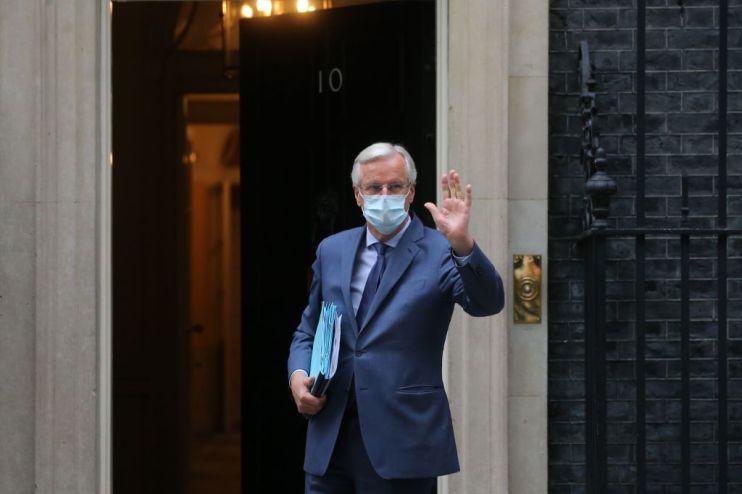Pay no attention to the EU negotiator behind the curtain

In the film the Wizard of Oz, the heroine, on finally arriving in the presence of the unseen Wizard, hears his booming voice telling her to go away and come back another time.
When her dog Toto pulls back the curtain in the grand room to reveal a small, old man operating the levers of illusion, Dorothy’s relationship with the Wizard instantly levels up.
Britain needs to pull back the curtain that hides the EU’s levers of illusion so that we can see things for what they are, if we are to achieve the right outcome on Brexit.
First we must not accept that, in the case of EU laws, the “law is just law”, denuded of EU-beneficial policy choices. Nor should we accept the idea that the EU’s own law is the necessary solution for an invisible north-south border for Northern Ireland, and for fair trade. The UK, just like any other country, needs to make and shape its own laws for its own evolving circumstances.
We do not need EU laws. There are standard, WTO-compliant solutions to an invisible border and fair trade which do not involve exposing any part of the economy to EU law. Even colonies declaring their independence have not subjected themselves to such restrictions.
Instead of going round in circles on the border issue, the UK’s sole focus should be on mutually beneficial future trade, while switching the major negotiating efforts to trade in services, which account for 80 per cent of the UK economy.
A services trade deal should be relatively simple to achieve — provided the EU plays its part. The key thing is to ensure that the EU removes duplicative regulation which will mean, for the most part, the mutual recognition of professional qualifications, and (for the highly profitable financial services sector) of regulatory standards. This can be done simply, through minor modifications to the existing EU law concept of equivalence. Already, the EU uses a basic equivalence-based approach for much of the world.
The result would be that the status quo on financial trade would continue. Businesses could carry on operating cross-border from the UK into the EU solely under UK regulation. That regulation would need to meet minimum standards, the most relevant being the international Basel Rules — but the UK already complies with such rules.
More important even than the benefits of doing such a trade deal is the cost of not doing it — on the EU’s side, given the Eurozone’s internal financial management.
The Eurozone is not a normal currency zone. Its financial firms can, under the EU system, offload the euro area’s phenomenal financial risk onto investors and savers around the world, in defiance of international standards.
Currently, the UK mitigates this risk for itself and the world by insisting UK-based banks carry top-up requirements, which impose extra costs on businesses here.
With the right mutual recognition trade deal — enhanced equivalence — the UK can continue after the end of December, as now, to mitigate the risk. But if the EU refuses, the UK (and the US as the other host of the global markets) would need to take strong protective action to minimise exposures to EU financial institutions, including EU subsidiaries of global firms. This would be a significant hit to European businesses — a reality the EU, like the Wizard, prefers to conceal.
If the EU rejects such a deal, thereby inflicting unnecessary financial expense on its citizens, the UK cannot allow the trade negotiations to result in sovereignty being undermined and should walk away outright. But it is in the EU’s interests to recognise and accept a mutually beneficial solution.
Our negotiators must ensure that the UK economy and its future trade is under UK, not EU, law and is based on reality not illusion.
Main image credit: Getty
